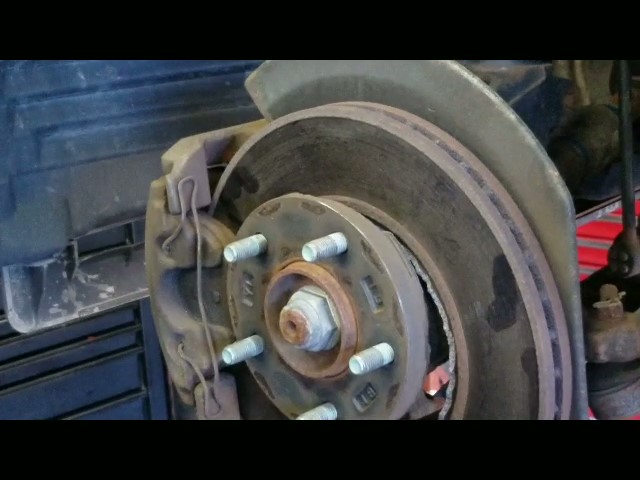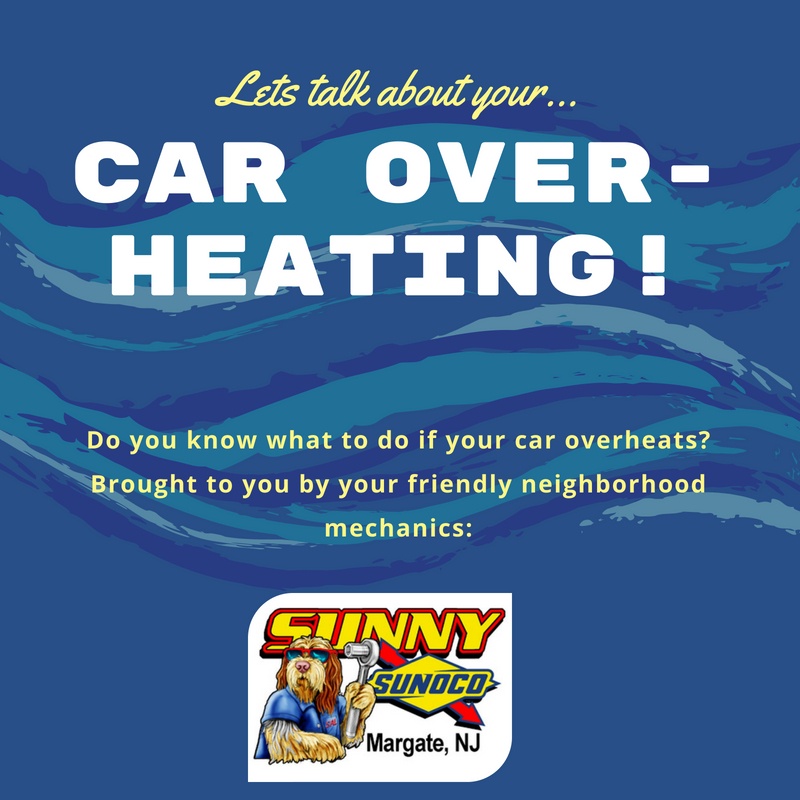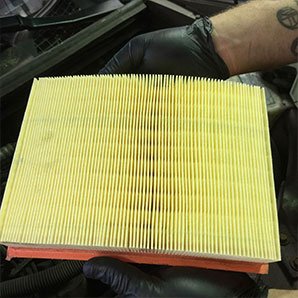Posted on 11/26/2018

Did you know that we offer a Complimentary Concierge service here at Sunny Sunoco in Margate? Well... we do! No need to rearrange your world and your closest driving friend (or person) to get your car worked on when you use us for your car needs! We will pick your car up anywhere on or around the Island of Atlantic city! That means: Atlantic City, Ventnor City, Margate City, Longport, Somers Point, Linwood, Northfield and parts of EHT. Would you want to get your car worked on while you are at work? We will be happy to pick up your car and, depending on the services needed, return it to you before you leave. Talk about convenient! If your service takes longer than a few hours we also offer loaner vehicles. If you would like a beach day (maybe this time of year is not the most ideal... but we don't judge..) we will chauffer you and yours down to the beach so you can enjoy the salt air and relax while also being productive. There is nothing more peac ... read more
Posted on 10/26/2018

Rotors What are they? Rotors, with assistance from the brake pads and calipers, cause your car to slow down and/or stop. They are the circular metal part that the brake pads rub against to cause the wheels to stop spinning. They are as important as brake pads for stopping. Why do they go bad? Heat isn’t a friend of metal parts. Heat from friction can cause warping and wear. For those of you that remember LP records, think of records that were left in the sun. Signs you need new rotors. Squeaking, rough stopping, vibrating when slowing, When your rotors go bad you will hear it and feel it. Make it over to your mechanic as soon as possible. Helpful Info Rotors should be replaced every 30-70 thousand miles. And when you change the rotors you should change your brake pads too. Since the rotors and brake pads rub together the brake pads are ‘mated&rsquo ... read more
Posted on 10/10/2018
.jpg)
Child Car seat safety: Congratulations! You have yourself a mini me! Now you have the pleasure of figuring out your child’s car seat for the next 80 pounds or so. Fun times. With all the changing laws, recommendations, and car seats, this can be a confusing and stressful time. You want to keep your precious one safe, but you would like for ‘them’ to hurry up and decide the right way to do that. As AAP (American Academy of Pediatrics) just changed the rear facing car seat recommendations to rear facing until 4yrs, it doesn’t look like they’ll get it together anytime soon. There is a way to help keep your sanity though, whenever you hear the recommendations have changed look at NHTSA (National Highway Traffic Safety Administration) website, it is THE guideline. (they have not changed their recommendation of three years old) Car seats have grown in safety and complexity from the salad days of the burlap sack, to the first ac ... read more
Posted on 9/11/2018
The next week and a half is looking to be very wet and, as we are already seeing, flooding has begun. Since our flood water is salt it can be very damaging to vehicles. We’d like to remind everyone that driving thru salt water is a big no-no. Salt water is corrosive. It will eat away at your car. Anything over 4 inches will damage a sedan sized vehicle. Remember tow trucks will not rescue you until the water recedes, so as I like to say, Better safe than sorry. So, If you think the water will reach your under carriage I repeat, do not drive thru. Electrical system and combustion systems do not like water and your car is basically these two systems. Also water plus electricity equals electrolysis (which causes the blue crude you sometimes see near battery terminals) If you find yourself in any of these scenarios, here is my advice to you: If you are driving and find yourself facing a flood, turn around! Do not attempt to go thru the water. You never know what is unde ... read more
Posted on 9/7/2018
TPMS Tire Pressure Monitoring System What is it? TPMS is a monitoring system that lets the driver know if they have a flat tire or if the tires are low on air. There are 2 types of TPMS. Direct TPMS- more expensive, more accurate, doesn’t have to be reset after filling the tire or replacing tires. Battery tends to last a decade. Once the battery goes they need to be replaced, about every 10 years. Indirect TPMS- counts rotation of tire against the other tires. Under-inflated tires need to rotate more to keep up. Does not use a pressure sensor. Has to be reset after filling tires. Not as accurate. Making a comeback as technology improves. If ALL tires are under inflated by the same amount the TPMS alert won’t be triggered. TPMS came about in the 1980s in European luxury cars and became mandatory in the United States in 2009 for light passenger cars. The thought was that it would decrease the amount of accidents due to poor tire care and pressure. All cars 2007 or newer ... read more
Posted on 9/6/2018
Thermostat: What is it? Every car has a thermostat. The thermostat in you car regulates the engine coolant temperature to cool off your engine. Thermostats don’t have an average lifespan. So there is no real recommended time to replace them. That is why it is important to get your check engine light read as soon as you can when it pops up or know what to do if it suddenly goes bad. How does it work? As the car heats up to 200 degrees, the thermostat opens (heat causes things to expand) and opens to allow circulation of the coolant thru the coolant system (which is a series of pipes that are housed around/ thru the engine) when the engine cools down enough (cold causes things to contract) it closes. When the thermostat goes bad it gets stuck, or doesn’t open which causes your car to overheat, or if it gets stuck in the open position it causes the car to be too cool which causes bad emissions, and bad efficiency, and accelerates wear. What are signs I need to get mine fixed ... read more
Posted on 8/15/2018

Overheating What does it mean when your car is overheating? Ruh roh, your gauge is climbing to the dreaded red H. What is causing it and what can you do to fix it before it destroys your engine or causes some very expensive bill? Cars start to over heat as they reach 250 degrees. (Cars usually run at 195-220 degrees. Just to give you an idea.) Now keep in mind that the boiling point for your coolant is 250–260 degrees. Not much wiggle room, is there? Why is it important? Cooling your engine is very important. As it is with most machines, like your computer, keeping things cool as they do their job keeps every thing from breaking down due to heat and friction. Here are some things that happen to your car as the temperature climbs. Lowers your fuel combustion efficiency Causes corrosion Starts to heat and warp the metal in and around your engine. Causes the viscosity of the liquid in your engine to change to gunk (oil, Co ... read more
Posted on 8/3/2018

So, your precious babyies are off to college! You want to make sure they’re prepared and safe. You have their dorm room supplies, class schedules, and you have all the emergency numbers tattooed to their arm. (ok, so maybe not tattooed). Have you checked on their car? Teenagers are notorious for letting car problems slide until the last minute. So, is their car up to scratch? Let’s see. ENGINE- Does the car have any check engine lights on? FUNCTION-Does everything work properly? (AC, Radio, Seat belts, turn signals?) WIPER BLADES-Do the wiper blades wipe away the rain? LIGHTS-Headlights, Brake lights, cabin lights, running lights? All glowing brightly? EMERGENCY CAR KIT-Do they have jumper cables and an emergency kit? BASIC CAR CARE-Do they have the know how to change a car tire? Can they read tire pressure? Can they execute basic car care? FLUIDS ... read more
Posted on 7/20/2018

Air Filters Cars can have one or two air filters. One is for your engine and new models have one for your breathing air. Your cabin air filter is located usually behind your dash on the passenger side of the car. Your air filter for your engine is located at the top of your engine in its own housing. Why do air filters matter to you? Air filters prevent debris from getting into your engine and damaging it. It also helps your car to run. Cars work on a combustion system. You need a spark and you need oxygen. Having clean filters also increases fuel economy. Cabin air filters protect the breathing air from pollen and dirt. Signs something is wrong: You’ve notice a drop-in fuel efficacy Your car sounds funny Your car has a check engine light Reduction of horsepower Your car is misfiring Smell of gasoline Black smoke and/or flames coming out of the exhaust Below are examples of clean and dirty engine air filters
Posted on 7/20/2018
So, you’ve been with your car a little over a year now. Your mind is beginning to wonder about what’s in store for you down the road. Your thinking about what could go wrong, and if you’re going to make it thru the rough times ahead. If you are anything like me you’re going to want to know what to expect. Usually if you do your routine maintenance you shouldn't have many problems (aside from a flat tire here and there, that darn nail!) Important flushes: Brake fluid Flush- 30k or every 2 years Coolant Flush- 30k or every 5 years Transmission Flush= CVT every 2 years (type of fluid) or 15 k for Honda and Acura Power steering Flush- 75-100k Rear differential- 30k-60k Induction Cleaning- 30k (15k with a lot of city driving) Important parts replacements: Timing Belts-60k-105k Shocks-4-5 years Water pump- 100k if you have a good one, a cheap one can go at 30k, also should be changed with timing belt if its driven by timing belt ... read more